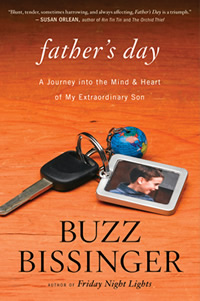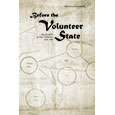A Father’s Journey
Journalist Buzz Bissinger shares a haunting, intimate account of his quest to know his special-needs son
Buzz Bissinger’s Father’s Day: A Journey into the Mind & Heart of My Extraordinary Son presents a classic story archetype: a father and son set off on a cross-country trip, where they begin to know and understand one another for the first time. The father in this case is Bissinger himself, a Pulitzer Prize-winning journalist and the author of Friday Night Lights, an account of Texas high school football that became the basis of both a film and a popular television drama. The son is Zach Bissinger, a cognitively disabled man in his mid-twenties who speaks in nonstop non sequiturs, can name and give the birthday of every person he has ever met, and memorizes maps to a degree that his family refers to him as a “human GPS.” Their ten-day road trip across America in 2007 is the backdrop for a haunting and brutally honest account of Bissinger’s attempt to understand the adult his special-needs child has become.
In 1983, Bissinger’s twin sons, Gerry and Zach, were born thirteen and a half weeks premature and in extreme distress. Survival of either twin was doubtful. Gerry was born three minutes ahead of Zach, and because of this and his position in the womb, his lungs were slightly more developed than Zach’s, which in turn meant his developing brain received more oxygen. After two months in the hospital, Gerry went home to lead an average life. Five months later, Zach finally went home to a life that was anything but average. Mentally impaired, physically and socially awkward, but displaying amazing feats of memory, Zach’s childhood was a series of specialists and special schools; caring for him caused a strain that Bissinger’s marriage could not survive.
 As a divorced father and an increasingly busy, successful journalist, Bissinger felt himself growing distant from Zach, even as he bonded with Gerry and a younger brother through ball games and special trips to Europe. Born into a family in which all children were expected to attend Ivy League universities and enter prestigious careers, Bissinger found himself ill-equipped to accept Zach’s likely future, where the best he might hope for was bagging groceries or working in a mail room. Watching Zach sleep as a child, Bissinger wished that he “could crawl inside him without ever waking him and reach into the marbled matter of the brain to reattach a wire here and a wire there, a couple of broken strands that just needed splicing, red to red, yellow to yellow, blue to blue.” He kept hoping his son would reach an “island of normalcy,” at the same time knowing it would be impossible.
As a divorced father and an increasingly busy, successful journalist, Bissinger felt himself growing distant from Zach, even as he bonded with Gerry and a younger brother through ball games and special trips to Europe. Born into a family in which all children were expected to attend Ivy League universities and enter prestigious careers, Bissinger found himself ill-equipped to accept Zach’s likely future, where the best he might hope for was bagging groceries or working in a mail room. Watching Zach sleep as a child, Bissinger wished that he “could crawl inside him without ever waking him and reach into the marbled matter of the brain to reattach a wire here and a wire there, a couple of broken strands that just needed splicing, red to red, yellow to yellow, blue to blue.” He kept hoping his son would reach an “island of normalcy,” at the same time knowing it would be impossible.
Against this backdrop father and son set out in a rented minivan on what Bissinger has called in a recent interview “the worst route ever taken in America.” Since Zach displays no response to natural wonders or tourist attractions but remembers every person he has met, and literally every street of every city in which he has lived, Bissinger chooses a route that intersects the various places they have lived, together and separately, with time left over for stops at an amusement park and Las Vegas.
 Since childhood, Zach has exhibited some autistic elements—as do all savants—and in some of the book’s scenes, especially given the context of a cross-country road trip, readers will be inevitably reminded of the movie Rain Man, but Zach has never had a straightforward diagnosis of autism. As Bissinger relates, specialist after specialist gave different opinions and suggested different courses of treatment and medication, many of which proved to be wildly wrong. Bissinger praises one honest doctor, who wrote of Zach, “He is a child who defies simplification and clear-cut diagnosis.”
Since childhood, Zach has exhibited some autistic elements—as do all savants—and in some of the book’s scenes, especially given the context of a cross-country road trip, readers will be inevitably reminded of the movie Rain Man, but Zach has never had a straightforward diagnosis of autism. As Bissinger relates, specialist after specialist gave different opinions and suggested different courses of treatment and medication, many of which proved to be wildly wrong. Bissinger praises one honest doctor, who wrote of Zach, “He is a child who defies simplification and clear-cut diagnosis.”
In the process of explaining Zach and his condition, Bissinger provides a fascinating history of the effects of premature birth—and the fairly big business a century ago of displaying incubator babies in freak shows at circuses and fairs. He also recounts the history of the savant and the nineteenth-century discovery that premature babies can develop into adults who, though otherwise incapable of complicated thought, become accomplished artists and pianists. With a style and journalistic skill reminiscent of Oliver Sacks in his chronicles of the human brain, Bissinger explains how the most interesting aspect of savant behavior is that it defies clinical explanation—the savant brain is different, but no one can say quite how. Bissinger quotes a leading expert, Darold Treffert: “The significance of the Savant Syndrome lies in our inability to explain it.”
Because Zach speaks without inflection or pause, and because Bissinger recorded the entire trip on tape, his exchanges with his son are richly portrayed, alternatively humorous and heartbreaking. Here is Bissinger trying to understand how much his son knows about his own condition, as they drive down the interstate:
—Do you know what brain damage is?
—No.
—What do you think it is?
—When your brain isn’t right?
—Do you know your brain is … not right?
—Yeah.
—How do you know that?
—I just know from my brain.
—Does it make you sad?
—Yeah a little.
Ultimately, what Bissinger comes to realize through a series of mishaps—and through his own and Zach’s responses to them—is that Zach has adjusted to his world and accepted it in a way that many people, especially Bissinger himself, would envy. “We assume people like Zach have no interior, that they’re embalmed in concrete, working rudimentary jobs,” he writes. “They just exist in the tiny Gaza Strip that is given over to the different and the disabled, shunted away behind the psychic fence that we Normals have erected out of unease or disdain.” Instead, he learns that Zach’s interior is rich indeed, if not in the way that most parents would expect or understand. For the first time Bissinger seems truly to accept his son.
Father’s Day is likely to become a must-read for any parent of a child with special needs, and may well become a heartwarming film shelved next to Rain Man. More than all of that, however, Bissinger has written a book that will speak to all parents and children who hope to understand one another, who wish to break the barriers placed between families by unrealized expectations and unfulfilled dreams.
Buzz Bissinger will discuss Father’s Day at the twenty-fourth annual Southern Festival of Books, held October 12-14 at Legislative Plaza in Nashville. All events are free and open to the public.


